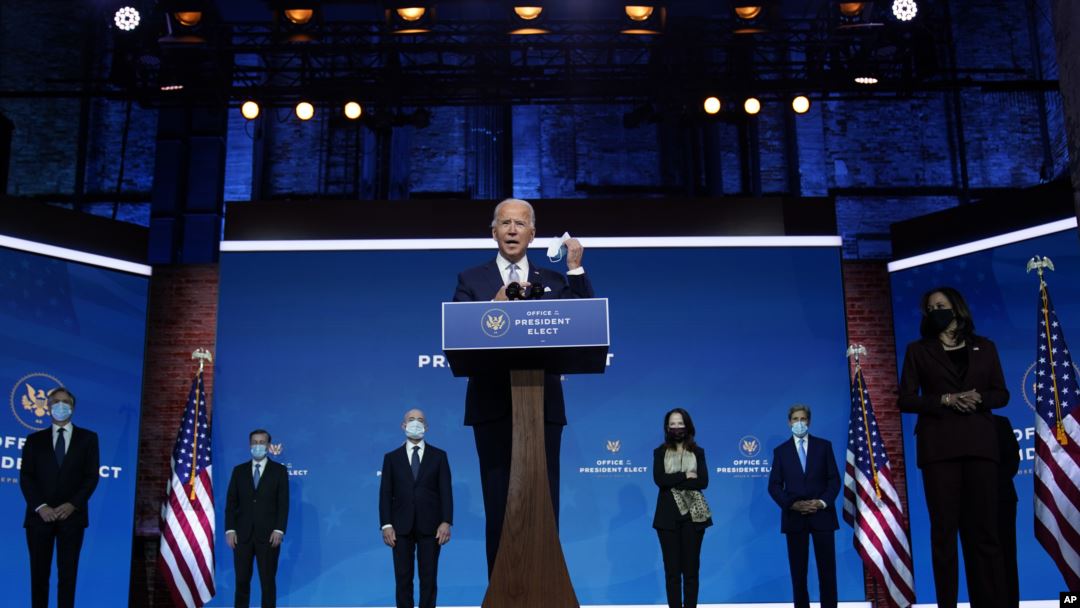
However, the dire forecast about a possible civil conflict between the supporters of two candidates still was avoided. The new US president will assume his functions on January 20th next year.
Given the political significance of the United States in global processes, the first steps of their new administration in the year ahead become a matter of great interest. And although the coronavirus pandemic has shown how the unexpected “black swans” can reverse the situation in the world, breaking all possible predictions, we can try to outline some future trends.
To reveal the nature of Biden’s future foreign policy we should look at his program as a candidate, the team he assembled in the relevant areas, as well as current trends in American geopolitics.
It is no secret that the Western leaders, including the EU (which President Trump has significantly damaged relations with) closely followed the US election. Therefore, we can expect a noticeable warming of the US’s ties with a number of European capitals, consolidation of efforts within NATO the activities of which Biden’s predecessor often criticized. Considering China, the US containment policy applied to Beijing is likely to be long-term.
Trump tried to weaken China by means of trade war and unsuccessful information attacks (which were made in order to create the image of China in the international community as the territory where the spread of the coronavirus started).
Instead, Biden, claiming the return of moral leadership in the world to America, might focus on human rights protection, referring to the problem of Uighurs and their oppression by the Chinese government as well as the democratic movement in Hong Kong. At the same time, the struggle for human rights could weaken relations with those allies which the Trump administration relied on in regional politics, namely Saudi Arabia, Turkey and Israel, if there are conditions in the American establishment.
The foreign policy of the new US president will also be aimed at concluding and returning to a number of international agreements and treaties that were terminated by his predecessor. This may be an attempt to conclude a new nuclear agreement with Iran (while the previous US government tried to overthrow the Iranian regime).
Given that climate issues are very important for Democrats, the United States can be expected to return to the signing of the Paris Climate Agreement, which Trump has withdrawn from. This will serve as an additional point of contact with the leaders of the Old World, in particular the French President Emanuel Macron.
Biden, unlike Trump, advocates the extension of the Strategic Arms Reduction Treaty (START-3) with the Russian Federation. The negotiations over this issue should be started at the beginning of the term, as the current agreement terminates in February.
The question of new administration’s policy towards Russia is extremely topical and controversial.
Given the fact that the Democratic president has been elected, they often refer to President Barack Obama’s weak response to Russia’s aggression against Ukraine in 2014, as well as the policy of “resetting” relations between Washington and Moscow during Dmitry Medvedev’s presidency (although the Georgian War of 2008 had already occurred).
However, witnessing the Putin’s aggressive policy against neighboring states and his sharp confrontation with the West, the Democrats have changed their approaches to the Kremlin after all. It could be said that, as with China, there is even a consensus with Republicans concerning this issue.
In addition, Biden has long been in politics and is familiar with the peculiarities of Kremlin activities since the Cold War. His team includes a number of so-called “hawks” of foreign policy, including the future head of the State Department, Anthony Blinken, who advocates more active provision of lethal weapons to Ukraine. Washington can be expected to maintain pressure preventing the launch of the Nord Stream-2 and to keep severe sanctions against the Kremlin after an investigation the recent cyber attacks on a raw of US authorities and organizations that have already been named the most dangerous in the country’s history.
Biden is knows the Eastern European region well and therefore he can be hoped to maintain his interest during his presidency. In particular, according to his foreign policy adviser Michael Carpenter, Washington will continue to support the Three Seas Initiative launched by President Trump. Therefore, America will keep its presence in this region in one way or another, or it may even strengthen to prevent Chinese and Russian influence.